
The United States committed to resettling 125,000 refugees in 2024, making it the largest resettlement program in the world
Over 100,000 have arrived
But like in all other resettlement countries, finding and securing safe and affordable housing for the new Americans remains one of the most pressing issues
Learn how
the US is trying to solve this vexing problem by following a refugee family’s journey to finding housing in their new country.

United States Refugee Admissions Program (USRAP)
The Naweeds are an Afghan family of six, two parents and four children. They have been selected for resettlement through the US Refugee Admissions Program (USRAP).
USRAP is managed by the Department of State in cooperation with the Department of Homeland Security (DHS) and the Department of Health and Human Services (HHS).
How was the decision made to place the Naweeds in Sacramento?
- In the US refugees are selected and placed through a formal consultation process where 10 resettlement NGOs negotiate with the federal government to decide how many and which refugees each organization can support in the states where they operate.
The 10 resettlement agencies - Among other things, the resettlement agencies are responsible for finding safe and affordable housing for the first 90 days after a refugee’s arrival. Usually, that means finding housing on the private market.
- The federal government provides the agencies a $1,350 payment per refugee to help with rent, food, clothing, furniture, employment assistance, school, medical, and legal services for the first 90 days.
- The one-time payment is often not enough, especially in high-cost areas. Every resettlement agency also fundraises and asks for private donations.
- To cover their administrative costs, the agencies receive $1,100 per refugee from the federal government.
- Church World Service (CWS), the NGO that selected the Naweeds, has placed them in Sacramento based on their US family ties, needs, and local resources.
To find housing and receive the Naweeds, CWS relies on its community-based local affiliate organization in Sacramento.
The 10 resettlement agencies have around 350 local affiliate offices throughout the country which help them settle refugees locally.
To help plan for the Naweed’s arrival, the CWS and its local affiliate in Sacramento have drawn up a checklist.
Family or community ties
Mohamed’s brother lives in Sacramento. The city also has a large and vibrant Afghan community.
Employment opportunities
As a bigger city, Sacramento has many job opportunities.
Schools
Schools in Sacramento meet all the needs of the children.
Medical care
Ashraf, the 13-year-old, has an issue with his lungs. Several hospitals in Sacramento offer the specialized care that he needs.
Interpreters and translators
The Naweeds speak Pashto. There are many Pashto interpreters in Sacramento.
Housing
The local affiliate organization is finding it hard to find housing for the Naweeds.
Usually, a resettlement agency like CWS only has a couple of weeks or less to prepare for a refugee family’s arrival. Such a short lead time makes it exceedingly difficult to find housing.
In the US, there is a shortage of safe and affordable housing for the population at large.
In Sacramento, like in most other resettlement locations, refugees often have to first stay in an Airbnb, hotel, or other temporary housing, for weeks or months before they can move into permanent housing.
In Sacramento, rent for a house or apartment with 3-4 bedrooms costs between 2,000-3,500/month.
Although worried and stressed, the local affiliate is determined to find housing for the Naweeds. The staff look at all available options
- Local affiliate staff visit the Refugee Housing Solutions (RHS) website, an important resource for resettlement stakeholders engaged in housing.
- The staff also attend a RHS webinar and receive direct technical help on how to effectively search for properties on various housing websites.
- The staff read through RHS toolkits and best practices.
- This helps them engage in targeted online searches on popular rental sites like Zillow, Craigslist, and apartments.com.
- At a Sacramento County Refugee Forum Meeting the staff talk to the California State Refugee Coordinator’s Housing Officer. The officer helps them target the search to local rental companies, and narrow it down to certain neighborhoods where there are more recent vacancies.
Read more
As they frantically search and apply, the staff realize that they do not have enough time to find permanent housing for the Naweeds. They will first need to find a temporary housing option.
Through CWS’s partnership with Airbnb, the local affiliates can book a house for a month. Airbnb has generously agreed to offer vacancies at a lower price for refugees. Airbnb also allows resettlement housing staff the option to cancel seven days before the start date.
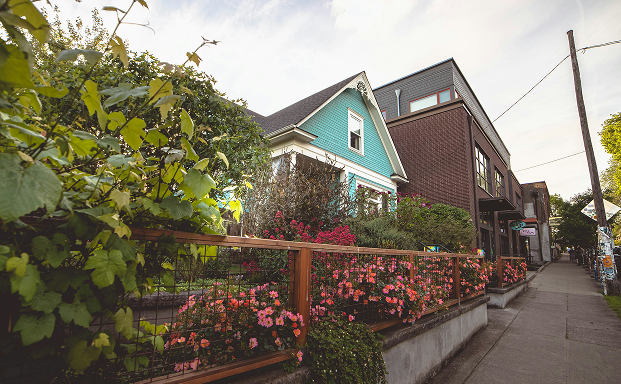

The staff look at hotels and Welcome Houses, which are fully furnished temporary apartments for newly arrived refugees that tend to cost less than an Airbnb.
In the end, because of limited availability elsewhere, the staff find and book a house on Airbnb for the Naweeds.
And they continue their search for permanent housing.


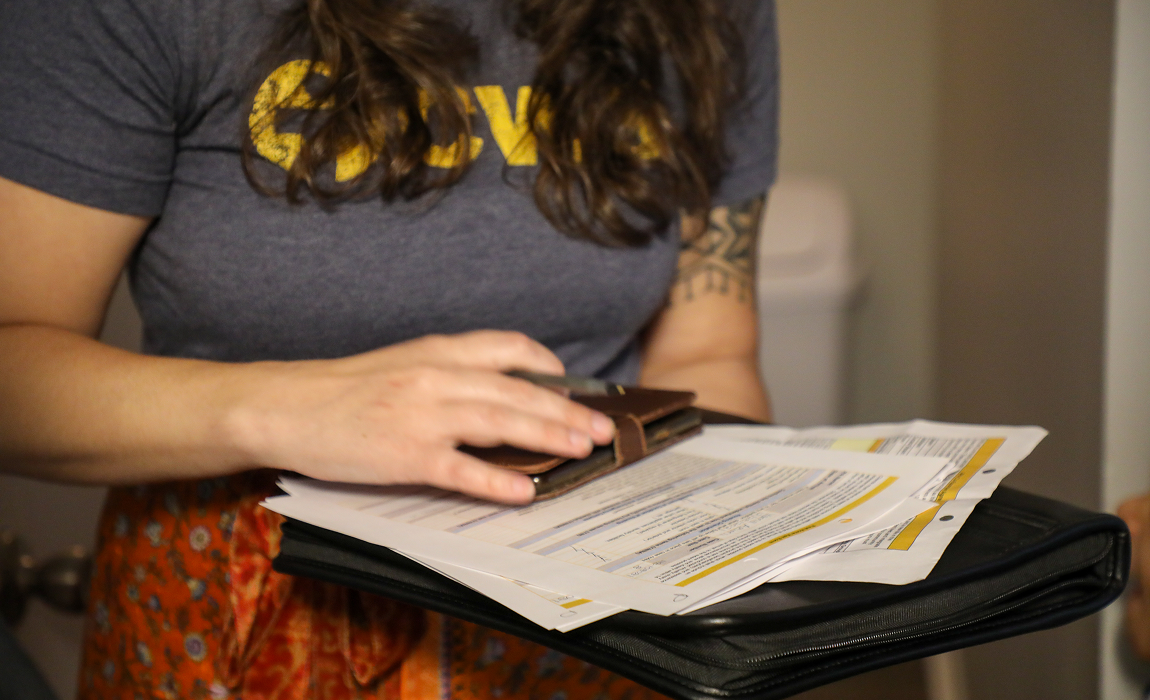
Finally, after 40 submitted applications, the local affiliate staff find something on a local rental housing website! A landlord replies to their application for a 3-bedroom house in West Sacramento which costs $2,000/month
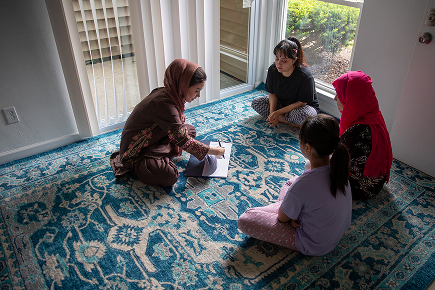
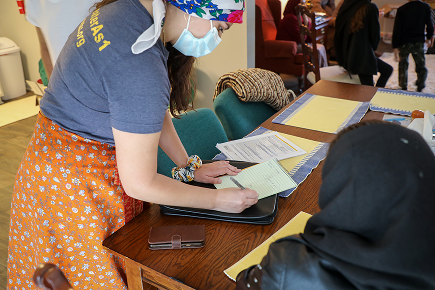
- The local affiliate staff meet the landlord at the house.
- There are no federal occupancy standards. However, resettlement agencies are required to perform a pre-arrival house inspection per an agreement they have with the federal government to ensure the housing is sanitary, safe, and affordable.
- The local affiliate staff perform an informal inspection of fire and electrical safety, water and mold, and signs of pests. They have consulted an inspection guide developed by HIAS, another resettlement agency.
- The housing must also comply with the Fair Housing Act and state and local laws and regulations.
- With the help of RHS toolkits and guides, the staff ensure that the terms of the lease, including the terms for the return of the security deposit, are reasonable.
- The house is certainly not perfect, but it seems to be in decent shape and well-maintained. It is in a fairly safe neighborhood, close to public transportation, schools, shops, other Afghans, and hospitals.

The landlord tells the staff that he has never rented to refugees before. He is a little skeptical about their legal status and if they will be able to pay. He worries that they do not have a credit history, which is really important in the US when buying or renting a home
The local affiliate staff anticipated this situation, as it has come up before. They have a number of tools to convince him that the family will be good renters. They:
- Provide a promissory letter of support from the resettlement agency which says that the Naweeds have legal status, that they will receive rental assistance up to three months, and help with finding employment as soon as possible.
- Tell the landlord that he can forgo a credit check for the Naweeds, as long as long as he does not not violate the Fair Housing Act.
- Tell him that refugees, from statistics and decades-long experience, are usually reliable renters.
The local affiliate staff wish that they:
- Could tell the landlord that they have access to a Housing Guarantee Fund, like the resettlement agency HIAS. This fund offers up to six months of financial backstopping in case of rent nonpayment or property damage.
- Had access to a version of Housing New Americans, a rental incentive program run by Metro Housing Collaborative in Omaha, Nebraska. The incentive offers landlords who rent to resettled refugees $750 at move-in and $750 at six-month residency for families of six or more.
- Had access to the Afghan Support and Investment Program (ASIP), but the Naweeds unfortunately arrived before the program started. Under ASIP, the Naweeds would have been eligible to receive rental assistance, payment of their security deposit, and payment of their utilities up to 12 months. A similar program exists for Ukrainian refugees.
- Will see in the future, through continued housing advocacy, special housing assistance made available to all refugees.
The landlord agrees!
The local affiliate can add him to their network of refugee-friendly landlords, which may come in handy for a future refugee family in need of housing.
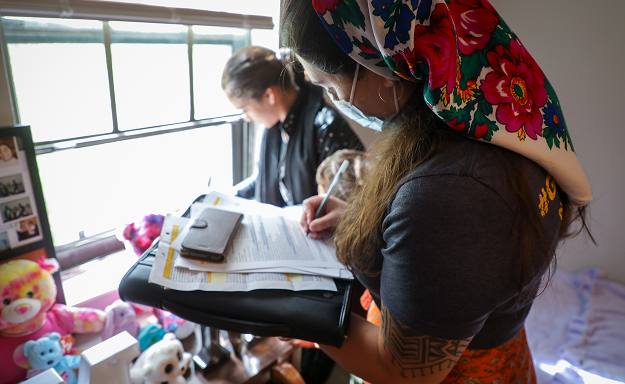

Most of the federal cash assistance for the Naweeds will go to covering rent, utilities, and food for the first few months.
The local affiliate turns to private donations to furnish the house with basic equipment and to provide the family with clothing.
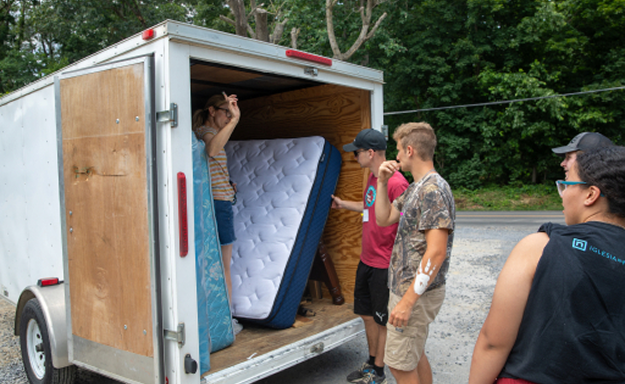
Finally, the house is ready for move-in
The Naweeds are notified. They are thrilled to be moving into their own place!

After two weeks in the Airbnb, the Naweeds are finally in their own home
In the next few days, staff inform the Naweeds about how their lease works, about their housing rights and where they can turn to get help in case they face eviction or encounter unsafe or unsanitary conditions in the house. And much more.
- But their housing journey, unfortunately, is not over yet.
- The looming issue: the federal cash assistance will only cover the rent for two to three months.
- In many refugee-receiving states, like California, the rental burden of refugees is 60-80% of their income, compared to the national average of around 50%. This places refugees under severe financial stress. It places around 60% of new arrivals at risk of homelessness.
The Naweeds have two options: either find jobs quickly or apply for low-income assistance programs for refugees and the population at large
Apply for government low-income housing assistance programs, such as Housing Choice Voucher Program (also known as Section 8)
- The programs are underfunded: only 1 in 4 eligible applicants receive it.
- Since the income ceiling is very low, it is likely that even one working family member in a low-paying job will make the family ineligible.
- On the policy level, resettlement agencies have for years lobbied the government to dramatically increase federal housing assistance to meet the need of millions of Americans, including immigrants and refugees like the Naweeds.
Apply for Refugee Cash Assistance and find employment
- Achieving economic self-sufficiency quickly is a key integration objective in the US resettlement program.
- The staff tell the family that their best option is for the adults to find employment so that they can pay for the rent and other costs.
- But the staff know that as newcomers with limited English proficiency, the Naweeds will need time and help.
- Mohamed speaks English, but his degree in engineering is not recognized in the US. His wife Morsal’s English is very limited. She will need to take English classes before being able to apply for jobs or an education.
- Mohamed will need to find a job first.
- His brother suggests that he gets a Driver License, buys a car, and becomes an Uber driver, like many other resettled refugees across the country.
- Mohamed agrees, though this is not the future he envisioned.
- But getting a Driver License and buying a care takes time and money.
- The Naweeds are told that they can receive integration assistance services up to 5 years. The staff help the Naweeds apply for these services with the State of California soon after their arrival.
Their application for RCA is granted. The RCA will help meet their most basic needs, mainly rent and food., while they look for employment.
As a family of 6, they will receive around $2,000 per month in California, and they may be eligible for additional assistance with rent, food, and health insurance.
To get the RCA, the Naweeds have to enroll in sufficiency planning and employment training services.
They also have to find and maintain employment as soon as possible.
The RCA is not a long-term solution, and it may not be sufficient to pay for their rent and other expenses.
The Naweeds will probably ask for loans or donations from Mohamed’s brother and other members of the Afghan community.
Read more
After four months, Mohamed has obtained his Driver License
He has also managed to buy a car with help from friends and his brother. He has started working as an Uber driver
He continues to take employment training to help him eventually find a better paying job.
Morsal is learning English quickly, and hopes to find employment in the coming months
The Naweeds are able to stay in their home, for now











The stakeholders agree that the task is Herculean. It will require an inclusive approach, major investments, and many different kinds of solutions through old and new collaborations
Disclaimer
The information contained in this site does not claim to be representative in regard to the provisions, services, steps, challenges, solutions, etc., that refugees may experience on their housing journey. The information does not claim to be representative of the many profiles of refugees. Although based on empirical data, the characters and situations portrayed are entirely fictional. However, the information in this site does seek to capture typical provisions, services, steps, challenges, and solutions, and common refugee profiles, as far as possible.
Resources
The United States Refugee Admission Program (USRAP) has a range of good housing practices, policies, and models that can inform and inspire resettlement stakeholders across the globe. Whether you are a government or NGO, a new program or old, a small program or large, you will find these resources useful. Explore how below. To contextualize and fully understand practices and solutions, we recommend that you first take the refugee housing journey in the United States here.
An overview of how the USRAP program works can be found in The UNHCR Resettlement Handbook’s country chapter for the United States, last updated in 2022: https://www.unhcr.org/resettlement-handbook/wp-content/uploads/sites/153/2023/02/Country-Chapter-United-States-2022.pdf
General information and recent news about the program can be found at the official USRAP website, which contains links where you can learn about the determination process, the consultation process, the security screening process, and more: https://www.uscis.gov/humanitarian/refugees-and-asylum/usrap
The United States keeps statistics on where refugees are resettled by state. You can access the statistics here: https://www.wrapsnet.org/admissions-and-arrivals/
Federal resettlement services are implemented and coordinated on the state-level by State Refugee Coordinators (SRCs). States also provide their own services for refugees, in addition to federally-funded services. Each SRC’s website can be accessed here: https://www.acf.hhs.gov/orr/grant-funding/key-state-contacts
Resettlement Agencies. Resettled refugees in the US are received by 10 NGOs (resettlement agencies) and their many local affiliate organizations. The NGOs receive funding from the federal government, but they also rely on private donations and volunteers. Among other integration support, the resettlement agencies are responsible for finding and securing safe and affordable housing for the first 90 days after arrival of the newcomers. Learn more about the resettlement agencies:
- Bethany Christian Services (BCS), https://bethany.org/
- Church World Service (CWS), https://cwsglobal.org/
- Episcopal Migration Ministries (EMM), https://episcopalmigrationministries.org/
- Ethiopian Community Development Council (ECDC), https://www.ecdcus.org/
- Global Refuge, https://www.globalrefuge.org/
- HIAS, https://www.globalrefuge.org/
- International Rescue Committee (IRC), http://www.theirc.org/
- U.S. Committee for Refugees and Immigrants (USCRI), https://refugees.org/
- United States Conference of Catholic Bishops (USCCB), https://www.usccb.org/
- World Relief (WR), http://www.wr.org/
The Matching Grant Program. Helps refugees and other ORR-eligible populations overcome barriers and quickly find jobs. The goal is for refugees to become economically self-sufficient through employment within 240 days of arrival and without accessing cash assistance programs. The program also helps with housing and utilities. Learn more here: https://www.acf.hhs.gov/orr/programs/refugees/matching-grants.
Afghan Support and Investment Program (ASIP) and Housing Assistance for Ukrainians (HAU). The California Department of Social Services (CDSS) developed ASIP and HAU to support the transition of recent Afghan and Ukrainian newcomers to long-term housing and self-sufficiency in California. The support, which differs somewhat for the two national groups, includes scaled rental assistance for up to twelve months; initial security deposit up to the full amount; utility assistance up to the full amount; and light-touch case management. Learn more here: https://www.cdss.ca.gov/asip and here https://www.supportguide.org/hau.
The Department of Housing and Urban Development (HUD) Resource Center is a general resource that can help refugees and resettlement agencies find affordable housing options and local Public Housing Authority offices in specific locations. Learn more here: https://resources.hud.gov/
Especially useful to:
- Resettlement programs that are looking for ways to directly engage and collaborate with non-governmental service providers.
- Resettlement stakeholders who are looking for practices and models on how to work and collaborate with NGOs to assist and support refugees with housing.
- Resettlement programs that are looking for scalable and generalizable financial support services.
Housing Supply Action Plan. The plan from 2022 is a set of legislative and administrative actions that aim to close America’s housing supply shortfall, starting with the creation and preservation of hundreds of thousands of affordable housing units. Learn more here: https://www.whitehouse.gov/briefing-room/statements-releases/2022/05/16/president-biden-announces-new-actions-to-ease-the-burden-of-housing-costs/
Especially useful to:
- Resettlement stakeholders who are looking for national plans on how to increase the affordable housing supply.
RHS is a unique organization. Led by CWS and funded by the federal government, RHS provides technical housing support to resettlement practitioners, landlords and property managers, refugees, and volunteers across the United States and partners with them to develop and implement cohesive strategies to increase the availability and affordability of housing. RHS serves all ten national resettlement agencies and partners with critical housing stakeholders. It has a very broad range of tools, resources, and solutions, including:
Resource Library. The library contains toolkits, research studies, webinars, guides, trainings, and much more, tailored to specific stakeholders (landlords/property managers, community sponsors, resettlement agencies, federal agencies, refugees). The resources address topics such as best practices, housing policy and advocacy, and how to partner with property managers/landlords.
Tailored Technical Assistance. RHS provides expert support to individuals, groups, and organizations to help them address specific challenges or enhance their knowledge and skills. RHS offers guidance, resources, and best practices tailored to your unique needs. Assistance is available to resettlement practitioners, housing providers, sponsors, and volunteers through educational tools, training, and one-on-one support.
Housing Directory. A central database of housing support services and resources for different locations. It helps refugees and other people involved in resettlement find important local housing information. Click on your state below to find housing services and other valuable resources specific to your state.
National Housing Working Group. The National Housing Working Group meets monthly as a collaborative opportunity to discuss housing challenges and opportunities, provide resources, make new connections, and to advance innovative housing solutions.
Regional Housing Community of Practice. The regional housing communities of practice are designed to share best practices and thought leadership to expand access to affordable housing and create innovative solutions across the United States.
Partnership with Marriott. Marriott Bonvoy members can donate their points, which are then converted to cash donations distributed among all 10 national refugee resettlement agencies. These funds will be used to secure short-term accommodation for refugees.
Read more here: https://refugeehousing.org/.
Especially useful to:
- Resettlement programs that are interested in introducing a comprehensive national platform and resource bank.
- Resettlement programs that are interested in introducing technical housing assistance.
The US conducts the Annual Survey of Refugees (ASR), the country’s unique source of data on the experiences of refugees who recently resettled in the United States. The ASR offers a window into refugees’ progress during their initial five years after arrival. The ASR collects household information, as well as individual information, including information on household homeownership and secondary migration. Learn more here: https://www.acf.hhs.gov/orr/programs/refugees/annual-survey-refugees
Especially useful to:
- Resettlement states that are looking for data collection tools to track, assess, and present housing-related data.
Housing Guarantee Fund. Created in May 2022 by the resettlement agency HIAS, the fund allows HIAS to backstop newcomer leases financially by co-signing or otherwise guaranteeing them, so landlords do not hesitate to welcome refugees as tenants. The Fund’s two-year history and impact is detailed in this report: https://refugeehousing.org/resources/housing-guarantee-fund-year-two-impact-report/
Launch Capital Partners. A unique investment firm that invests around $100 million in safe housing which is rented to resettled refugees. The investment company works closely with resettlement agencies and other stakeholders. Its returns on investment match or exceed the traditional rental market. Learn more here: https://www.launch-intl.capital/ and here: https://www.youtube.com/watch?v=4Ff_f5AWglw&list=PLpxI04Mv6nqW2khqrx-z9FKnEUtpywHDQ&index=1
Housing New Americans Incentive. The incentive is administered by the Metro Housing Collaborative. Landlords receive $500.00 at move-in and $500.00 at 6-month residency for families of 5 or fewer and receive $750.00 at move-in and $750.00 at 6-month residency for families of 6+ as a benefit for renting to New American(s) coming with a refugee status through a resettlement agency. Read more here: https://metrohousingcollaborative.com/wp-content/uploads/2017/09/Property-OwnerManager-POM-Rental-Incentive-Flyer.pdf.
Re:home. A new company that has developed a one-stop-shop for landlords to get matched for free with refugee tenants, faster than the open market. Re:home partners with RHS. Learn more here: https://rehomemarketplace.com/
Verent Solutions. This social impact technology start-up has developed Pacto, a Property Management App platform that supports refugee tenant–landlord relationships, including language translation. Verent Solutions partners with RHS. Read more here: https://refugeehousing.org/news/refugee-housing-solutions-partners-with-verent-solutions/.
Especially useful to:
- Resettlement stakeholders who are looking for new models of financial housing assistance.
- Resettlement stakeholders who are looking for new models of finding housing on the private market for refugees.
- Resettlement stakeholders who are looking for ways to creatively expand the available housing locations for refugees.
Refugee Housing Planning Study. An in-depth study on the housing situation of refugees in Omaha, so that Omaha can create better systems that provide more complete support. The study analyzes placement data from 2021 to 2024, including: the number of families resettled, family size, monthly rent, the number of bedrooms, and zip codes of where families were settled. The study shows that the median rent paid by refugee families has stayed about the same over the past four years. It $1,025/month in 2023. In 2023 the average apartment size was 2.3 bedrooms. Read the full study here: https://rdomaha.org/refugee-housing-planning-study/
State Housing Needs Assessment Report: A Survey of State Refugee Coordinators. An RHS survey with critical insights into the housing challenges faced by refugees in 26 states. With key data on housing affordability, service gaps, and barriers to stable housing, the report highlights areas where targeted solutions are needed most. The findings will inform ongoing efforts to expand housing resources, develop strategic partnerships, and improve access to affordable housing for refugees and other newcomers. Read the survey report here: https://refugeehousing.org/resources/state-housing-needs-assessment-report/
The Urban Institute. A nonprofit research organization that provides data and evidence to help advance upward mobility and equity. Access a wide variety of studies and evidence-based proposals on housing reforms that can increase the availability of safe and affordable housing: https://www.urban.org/
Academic and Other Studies. There is a wide variety of empirical and analytical studies on various aspects of USRAP, including housing. Here are a few recent studies:
- Landis, Joseph, “Refugee housing in the United States: Improving the Refugee-Welcoming Rental Market,” Master Thesis, Massachusetts Institute of Technology, 2024, https://dspace.mit.edu/bitstream/handle/1721.1/155504/landis-landisj-mcp-dusp-2024-thesis.pdf?sequence=1&isAllowed=y
- Suchismita Bhattacharjee and Chie Noyori Corbett, “Housing condition and preferences of refugee immigrants in Dallas, TX,” Wellbeing, Space, and Society, 2023, https://www.sciencedirect.com/science/article/pii/S2666558123000234.
- Matthew La Corte and Claire Holba, “Rebuilding the U.S. refugee program: A case study in how to increase state capacity,” Niskanen Center, October 2, 2024, https://www.niskanencenter.org/rebuilding-the-u-s-refugee-program-a-case-study-in-how-to-increase-state-capacity/
- Molly Fee, “Resettlement Knowledge: The Expertise of Service Providers,” Refugee Survey Quarterly, August 10, 2024, https://academic.oup.com/rsq/advance-article/doi/10.1093/rsq/hdae008/7731440
Especially useful to:
- Resettlement stakeholders who are looking for independent studies on how the program works.
- Resettlement stakeholders who are looking for independent studies on how to scale programs, including offering more housing.
- Resettlement stakeholders who are looking for independent studies on housing challenges and experiences among refugees.
Omaha Refugee Taskforce Housing Subcommittee. A committed group of local non-profit leaders, caseworkers, landlords and citizens who are passionate about improving housing situations for our refugee neighbors. The group meets once a month. Learn more here: https://omaharefugees.com/?page_id=2923.
Especially useful to:
- Resettlement stakeholders who are looking for models to create public-private coordination networks around housing.











